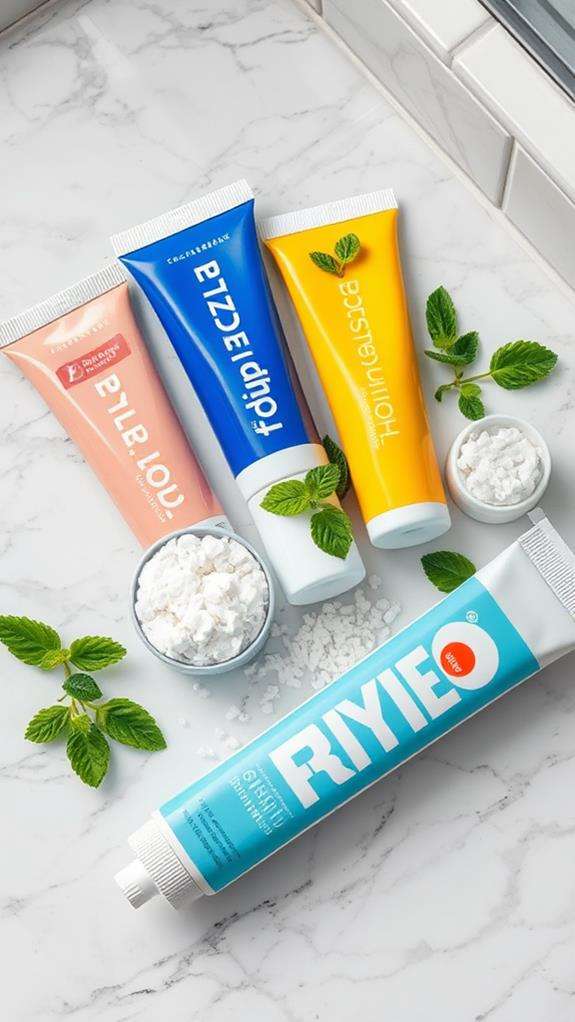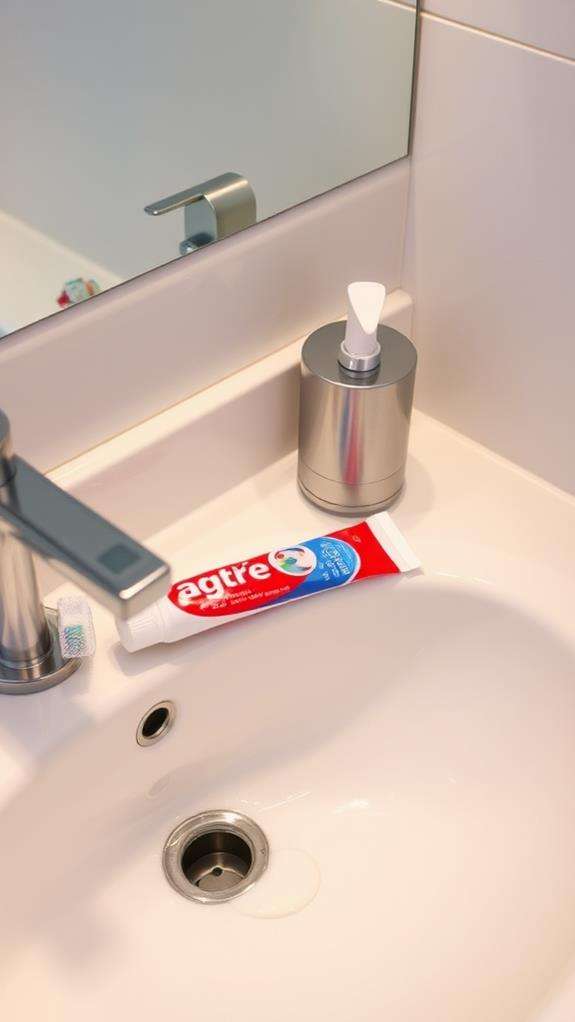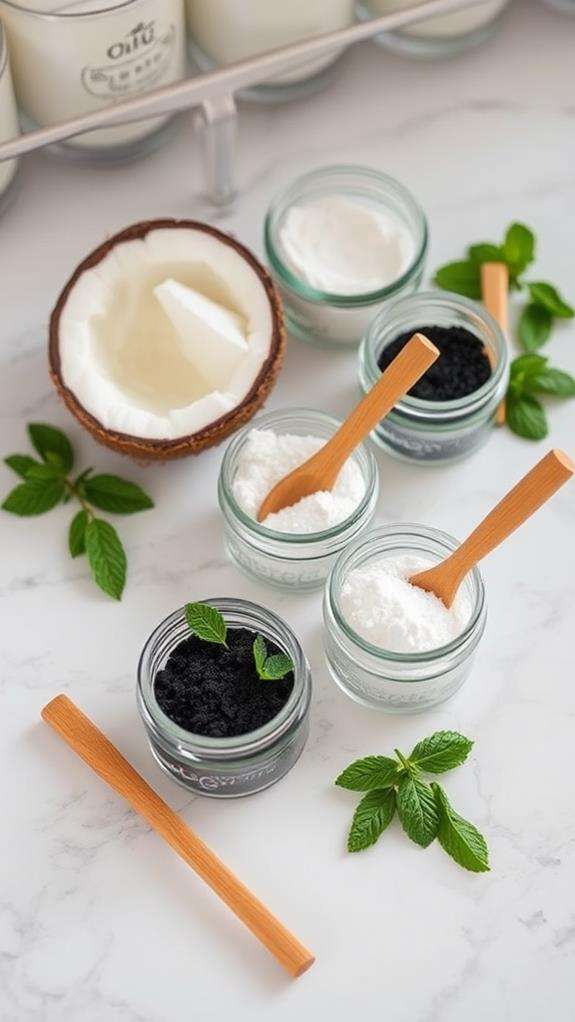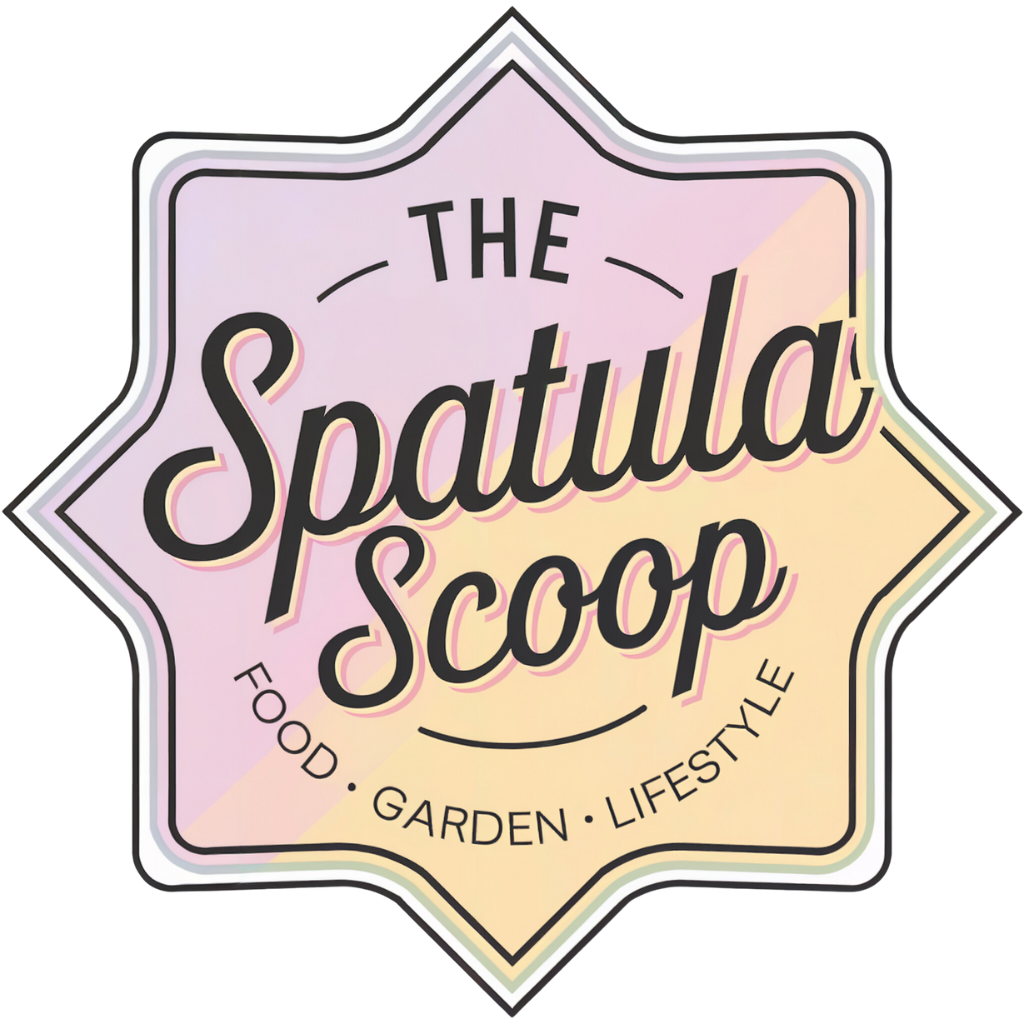Is It Safe to Eat Toothpaste
Eating toothpaste isn't safe, despite its minty flavor. While accidentally swallowing small amounts occasionally won't typically harm you, intentional consumption can lead to health risks. Toothpaste contains ingredients like fluoride, abrasives, and detergents that aren't meant for ingestion. Swallowing large quantities can cause stomach upset, nausea, and vomiting. Children are especially vulnerable to fluoride toxicity due to their smaller size. Chronic ingestion may result in dental fluorosis, affecting tooth enamel. If you're craving toothpaste's taste, safer alternatives exist, such as sugar-free gum or mint-flavored candies. To fully understand the potential consequences and explore better options, it's worth investigating further.
This post may contain affiliate links. If you make a purchase through these links, I may earn a commission at no additional cost to you. Additionally, portions of this post may be generated using artificial intelligence (AI) technology. While we strive for accuracy, please be aware that AI-generated content may not always be perfect and should be fact-checked when necessary.
The Spatula Scoops
- Toothpaste is not designed for consumption and can cause digestive issues if ingested.
- Swallowing small amounts occasionally is unlikely to cause harm in adults.
- Ingesting large quantities can lead to stomach upset, nausea, or vomiting.
- Children are more susceptible to fluoride toxicity due to their smaller body size.
- Chronic ingestion of fluoride can cause dental fluorosis, affecting tooth enamel development.
Common Toothpaste Ingredients

Toothpaste's ingredients vary by brand, but most contain a few key components. You'll typically find fluoride, which helps prevent tooth decay by strengthening your enamel. Abrasives, like calcium carbonate or silica, work to scrub away plaque and stains from your teeth. Detergents, such as sodium lauryl sulfate, create the foaming action you're familiar with when brushing. While toothpaste is designed for oral use, ingesting large amounts can lead to food poisoning risks similar to those associated with expired foods.
Many toothpastes also include humectants like glycerin or sorbitol to prevent the paste from drying out. Flavorings, often derived from mint oils, give toothpaste its characteristic taste. Some brands incorporate whitening agents like hydrogen peroxide or baking soda. Preservatives are added to extend shelf life and prevent bacterial growth.
You might encounter specialized ingredients in certain toothpastes. For instance, desensitizing toothpastes may contain potassium nitrate or strontium chloride. Natural or organic toothpastes often use alternative ingredients like xylitol or essential oils. It is crucial to comprehend that while these ingredients are safe for oral use, they're not meant for ingestion in large quantities. Always check the label if you have specific concerns or allergies.
Effects of Ingesting Toothpaste
Swallowing small amounts of toothpaste occasionally won't typically cause harm, but ingesting large quantities can lead to adverse effects. If you consume too much toothpaste, you might experience stomach upset, nausea, or vomiting. In more severe cases, excessive fluoride intake can cause fluorosis, a condition that affects tooth enamel and bone development. Similar to chicken food safety, it's vital to be aware of the potential risks associated with ingesting substances not intended for consumption. Toothpaste left out overnight may also harbor harmful bacteria, increasing the risk of illness if ingested.
For children, ingesting large amounts of toothpaste can be particularly dangerous. Their smaller bodies are more susceptible to the effects of fluoride and other ingredients. Overconsumption may lead to abdominal pain, diarrhea, or even more serious symptoms like difficulty breathing or convulsions.
Some toothpastes contain sodium lauryl sulfate (SLS), which can cause digestive issues if ingested in large quantities. Additionally, the abrasives in toothpaste, while safe for teeth, aren't meant for internal consumption and may irritate your digestive tract.
If you or someone you know has ingested a significant amount of toothpaste, it's essential to contact a poison control center or seek medical attention immediately. They'll provide guidance based on the specific situation and ingredients involved.
Accidental Swallowing: How Concerned?

Concern about accidentally swallowing toothpaste is common, but it's usually not a cause for alarm. Most toothpastes contain fluoride, which can be harmful in large quantities, but the amount in a typical pea-sized dollop is minimal. If you've accidentally swallowed a small amount, you're unlikely to experience any adverse effects. While toothpaste isn't designed for consumption, its risks are generally lower than those associated with eating uncooked rice, which can lead to food poisoning and long-term health issues.
However, it is crucial to be aware of potential risks and take appropriate precautions. Here's what you need to know:
- Fluoride toxicity: Ingesting excessive amounts of fluoride can lead to stomach upset, nausea, or vomiting.
- Children's risk: Young children are more susceptible to fluoride toxicity due to their smaller body size.
- Long-term effects: Chronic ingestion of fluoride can cause dental fluorosis, which affects tooth enamel.
- Poison control: If you're concerned about ingesting a large amount, contact poison control for guidance.
To minimize risk, use only a pea-sized amount of toothpaste, supervise children while brushing, and teach them to spit out the toothpaste rather than swallowing. If you're particularly concerned, consider using a fluoride-free toothpaste alternative. Remember, proper oral hygiene is paramount, so don't let this concern deter you from regular brushing.
Intentional Toothpaste Consumption
Curiosity often leads people to wonder about the safety of intentionally consuming toothpaste. While it might seem harmless, you should be aware that toothpaste isn't designed for ingestion. Most toothpastes contain fluoride, which can be toxic in large amounts. If you're considering eating toothpaste, it is paramount to understand the potential risks.
Intentional consumption of toothpaste can lead to digestive issues, including nausea, vomiting, and diarrhea. In severe cases, it may cause more serious problems like electrolyte imbalances or fluoride toxicity. The artificial sweeteners and foaming agents in toothpaste can also irritate your stomach lining. Furthermore, some people develop an eating disorder called pica, which involves craving and eating non-food items, including toothpaste.
From an SEO perspective, this topic might generate high search volume due to its unusual nature. However, it is critical to provide accurate, authoritative information to rank well in search engine results pages (SERPs). When creating content on this subject, focus on long-tail keywords like "dangers of eating toothpaste" or "toothpaste ingestion side effects" to capture specific user queries and improve your content's visibility in search results.
Safer Alternatives to Eating Toothpaste

If you're tempted to eat toothpaste, it is essential to understand that there are safer alternatives that can satisfy similar cravings or needs. While toothpaste isn't meant for consumption, you can explore other options that are both safe and beneficial for your health.
Consider these alternatives:
- Sugar-free gum: Chewing gum can provide a similar minty flavor and oral stimulation without the risks associated with ingesting toothpaste.
- Mint-flavored candies: Opt for sugar-free varieties to satisfy your craving for a fresh taste without harming your teeth.
- Flavored dental floss: Use mint-flavored floss to clean your teeth and enjoy a subtle taste without swallowing anything harmful.
- Fresh herbs: Chew on mint leaves or parsley for a natural breath freshener and flavor boost.
These alternatives offer similar sensory experiences without the potential dangers of consuming toothpaste. It's important to remember that toothpaste contains ingredients not meant for ingestion, such as fluoride and detergents. By choosing safer options, you're prioritizing your health while still addressing your desire for a minty or fresh taste. Always consult a healthcare professional if you're experiencing persistent cravings or concerns about your oral health.
Frequently Asked Questions
Can Toothpaste Be Used as a Teeth Whitening Treatment if Swallowed?
You shouldn't use toothpaste as a teeth whitening treatment if swallowed. While toothpaste contains ingredients that can brighten teeth, it's not designed for ingestion. Swallowing toothpaste can lead to stomach upset and, in large quantities, more serious health issues. For safe teeth whitening, use over-the-counter products specifically designed for this purpose or consult your dentist for professional treatments. Remember, toothpaste is meant for external use only, so always spit it out after brushing your teeth.
Does Eating Toothpaste Help Freshen Breath From the Inside Out?
No, eating toothpaste doesn't freshen your breath from the inside out. While it may temporarily mask odors in your mouth, swallowing toothpaste isn't an effective or safe way to combat bad breath. Instead, focus on proper oral hygiene: brushing, flossing, and using mouthwash as directed. If you're concerned about persistent bad breath, it's best to consult your dentist. They can identify underlying causes and recommend appropriate treatments, which might include dietary changes or addressing potential dental issues.
Can Toothpaste Be Used as a Home Remedy for Upset Stomachs?
You shouldn't use toothpaste as a home remedy for upset stomachs. It's not designed for ingestion and contains ingredients that can be harmful if swallowed in large amounts. Instead, try proven remedies like ginger tea, peppermint, or over-the-counter antacids. If you're experiencing persistent stomach issues, it's best to consult a healthcare professional. They can provide safe, effective treatments tailored to your specific symptoms. Remember, toothpaste is formulated for oral hygiene, not internal use.
Is It Safe to Use Toothpaste as a Facial Mask?
You shouldn't use toothpaste as a facial mask. While it's tempting to try DIY skincare, toothpaste isn't designed for your face. It contains harsh ingredients that can irritate your skin, causing dryness, redness, or even chemical burns. Fluoride, a common toothpaste ingredient, may disrupt your skin's natural balance. Additionally, some toothpastes have abrasive particles that can damage your skin's delicate surface. Instead, opt for skincare products specifically formulated for facial use to guarantee safety and effectiveness.
Can Ingesting Toothpaste Help Prevent Cavities More Effectively Than Brushing Alone?
No, ingesting toothpaste isn't more effective at preventing cavities than brushing alone. In fact, it's not recommended to swallow toothpaste at all. Fluoride in toothpaste helps protect your teeth when applied topically, but swallowing excessive amounts can be harmful. Brushing properly with fluoride toothpaste is the most effective way to prevent cavities. If you're concerned about cavity prevention, focus on maintaining good oral hygiene habits and consult your dentist for personalized advice.
Conclusion
You've learned that eating toothpaste isn't safe or advisable. While accidentally swallowing small amounts during brushing isn't typically harmful, intentional consumption can lead to health issues. Remember, toothpaste is designed for oral hygiene, not as a snack. If you're craving minty freshness, there are safer alternatives like sugar-free mints or gum. Just as you wouldn't drink shampoo for silky hair, don't eat toothpaste for fresh breath. Stick to using it as intended – on your toothbrush.





